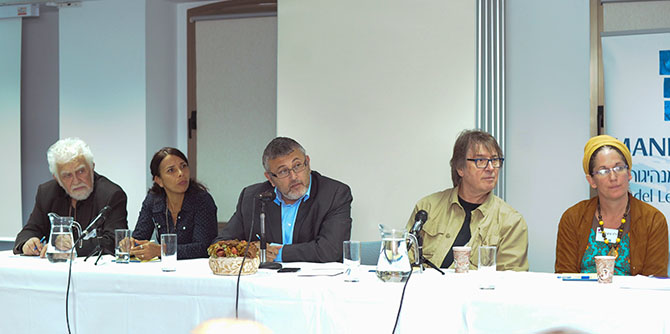What is the relationship between culture and leadership? Is there any connection between cultural heroes and leadership? On November 28, 2016, these questions were addressed at a Mandel Platform event that featured Arab-Israeli director and screenwriter
Ibtisam Mara’ana Menuhin; the poet
Sivan Har-Shefi; actor and director
Shmuel Atzmon, founder of Israel’s Yiddish Spiel Theater; and actor, director, and playwright
Oded Kotler.
The evening began with parallel sessions in which the artists presented insights based on their own experiences and discussed their work, artistic choices, and sources of inspiration. It continued with a panel discussion on the role and place of artists in Israeli society, social and political engagement of artists, and art’s capacity to bring about social change.

During the panel discussion, the panelists shared the following thoughts:
Oded Kotler: “Over the course of my life I’ve encountered two types of people: those who did a good job of running institutionally-supported cultural frameworks and were forced to be loyal to the establishment, and those who ignored the institutional coercion and paid a heavy price in their personal lives. It's more difficult to be a third type: to be part of the establishment, while fighting against it at the same time. That’s what I consider leadership.”
Sivan Har-Shefi: “The search for cultural heroes is, perhaps, the tragedy of culture. There is something about it that turns people into passive consumers of culture, as they assume: ‘there’s someone else who does things for us.’ For me, culture should be the exact opposite of that. It should take people out of their comfort zone.”
Ibtisam Mara’ana Menuhin: “I see myself as a kind of leader, mainly because of the price I pay. That’s the common denominator of leadership and cultural heroes.”
“What is necessary to increase the influence of artists in Israel?” asked poet and playwright
Dr. Ayman Agbaria, the Mandel Leadership Institute faculty member who moderated the event. The panelists responded:
Oded Kotler: “Lengthy, constant, and uninterrupted work, without the seal of approval of the establishment.”
Ibtisam Mara’ana Menuhin: “There must be more women involved in culture, in art… We don’t have time for art… We have an existential fear; we’re in a fight for survival… We need to stop this Sisyphean effort, to see a movie in Arabic, to go to the Yiddish theater, and to come home and think about art, about the Other.”
Shmuel Atzmon: “We need to respect art.… We Israelis haven’t included anything about different artists and different approaches in our education system; everything always focuses on Israel and Israelis. The greatness of Jews around the world was that they opened themselves up to the culture around them and created their own culture within it. They didn’t cut themselves off.”
